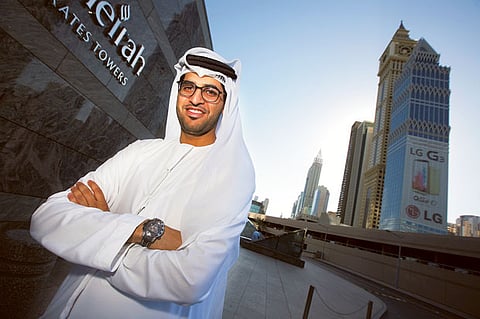Nabati poetry offers a glimpse into the past
Nabati poetry has preserved the Emirati heritage and will continue to be a big part of UAE culture

Dubai: Nabati poetry is not only a cherished pastime for Emiratis, but a powerful art that has preserved the Emirati heritage right from the start, says Emirati poet Ahmad Al Bidwawi, who sees no end to his love of Nabati poetry.
Drawn to poetry at the age of 10, Al Bidwawi’s first attempt to write a poem was an urge that came from within. He started with writing a poem in classical Arabic, his first to his uncle, and he was proud of how it turned out.
Then, with each passing day, he felt like there was something unique about Nabati poetry and, having been extensively exposed to it, he decided to stay with it and make it his primary focus.
“Poetry is beautiful in any language and in any dialect because, to me, words themselves are so expressive,” says Al Bidawi, 31.
A whole new world
“I can sense poetry and its beauty no matter in which style it’s written, but Nabati poetry in particular takes you to a whole new world,” he said.
Nabati poetry, he explains, is a style of poetry which was popular in the Arabian Peninsula and was adopted by many poets due to its ability to appeal to everyone. The local accent and the basic grammar it uses is what makes it easily understood.
“There’s a lot related to this style of poetry,” he says.
“If we look back in time, we will see that Arab culture was more into vocalised forms of expression such as poetry, speeches, and other forms of recitation. There was not much that was being documented at that time.
"Nabati poetry recorded the historical events of that era and offered a verbal illustration about the way our ancestors lived, how they moved from one place to another, and how they interacted with each other.”
According to Al Bidwawi, certain Nabati poems “also have the ability to teach younger generations good manners and encourage them to embrace the good values and norms of the previous generations”.
The unique aspect of Nabati poetry, Al Bidwawi says, is its ability to be a revivalistic device in the face of progress and development which have a tendency to make people drift a little away from certain aspects of their heritage and culture.
“The transition from a Bedouin society to a progressive nation tends to affect the culture and traditions of the place in one way or another,” he explains. “It is here that Nabati poetry still plays a strong role in helping preserve the Emirati heritage by always reminding us of how things were.”
After all, he says, Nabati poetry was the number one form of entertainment back in the day and men and women would gather to discuss it and, in doing so, Nabati occupied a major part of their lives.
“When poems were written back then,” says Al Bidwawi, “they were able to create peace or lead to war. They were able to solve problems between siblings or fix relationships between a husband and a wife. This is why I think the poems not only empowered our culture but also helped us in the daily process of living.”
Cultural narrative
Having said that, Al Bidwawi believes that the role of Nabati poetry and its important place in the UAE’s cultural narrative could change a bit with the younger generations, who may not be too involved in it due to other entertainment sources available to them.
But he holds out hope.
“Shows and programmes like those organised by the Hamdan Bin Mohammad Heritage Centre such as Al Beit and others will bring Nabati poetry closer to people,” he affirms.
In preparation for the 43rd National Day, Al Bidwawi says that many Emirati poets like him choose to write about these big events using the Nabati style as it tends to inspire people’s patriotism and arouse their national ambitions.
“With its lyrical sound, Nabati poetry touches their heart instantly and makes them so proud of their nation and its leaders. It naturally inspires their loyalty to their country,” he says.
Many UAE leaders, says Al Bidwawi, are poets and are his number one inspiration when it comes to writing Nabati. “Nabati poetry is ingrained in our culture and will live with us forever,” he believes.
Al Bidwawi currently works for the Executive Council of the Government of Dubai and is a television host for Al Beit, a programme about poetry competitions. He is also a radio host and has an ambition to collect all his Nabati poems and have them published as a book.
Sign up for the Daily Briefing
Get the latest news and updates straight to your inbox

